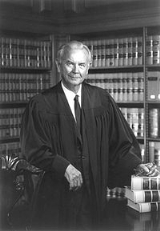
William J. Brennan, Jr.
Overview
Associate Justice of the Supreme Court of the United States
Associate Justices of the Supreme Court of the United States are the members of the Supreme Court of the United States other than the Chief Justice of the United States...
of the United States Supreme Court
Supreme Court of the United States
The Supreme Court of the United States is the highest court in the United States. It has ultimate appellate jurisdiction over all state and federal courts, and original jurisdiction over a small range of cases...
from 1956 to 1990. During his term on the Supreme Court, he was known for being a leader of the judicially liberal wing of the Court.
He was known for his outspoken progressive
Progressivism
Progressivism is an umbrella term for a political ideology advocating or favoring social, political, and economic reform or changes. Progressivism is often viewed by some conservatives, constitutionalists, and libertarians to be in opposition to conservative or reactionary ideologies.The...
views, including opposition to the death penalty and support for abortion
Abortion
Abortion is defined as the termination of pregnancy by the removal or expulsion from the uterus of a fetus or embryo prior to viability. An abortion can occur spontaneously, in which case it is usually called a miscarriage, or it can be purposely induced...
rights. He authored several landmark case opinions, including Baker v. Carr
Baker v. Carr
Baker v. Carr, , was a landmark United States Supreme Court case that retreated from the Court's political question doctrine, deciding that redistricting issues present justiciable questions, thus enabling federal courts to intervene in and to decide reapportionment cases...
, establishing the "one person, one vote" principle, and New York Times Co. v. Sullivan
New York Times Co. v. Sullivan
New York Times Co. v. Sullivan, 376 U.S. 254 , was a United States Supreme Court case which established the actual malice standard which has to be met before press reports about public officials or public figures can be considered to be defamation and libel; and hence allowed free reporting of the...
, which required "actual malice" in a libel suit against those deemed "public figures".

